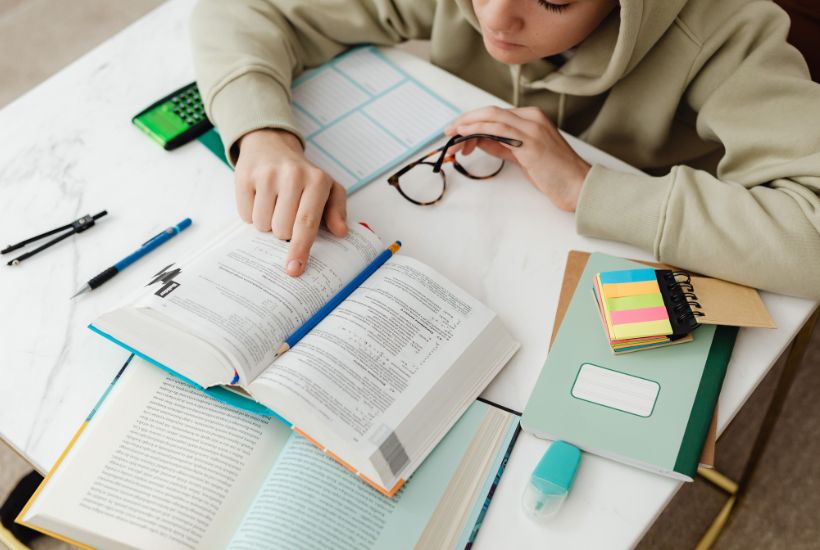How to help your child develop good study habits
It can be challenging to help your child develop good study habits. Still, they can learn how to study effectively and achieve great things in school with guidance and encouragement.
In this article, we will discuss the importance of developing good study habits, offer tips for creating a routine for studying, setting goals, breaking down big projects into manageable tasks, and establishing a positive relationship with learning.
With a little effort, your child can develop the skills they need to reach their full potential.

18 Tips for Parents to Help Your Child Develop Good Study habits
- Create a study schedule
- Help them set realistic goals.
- Help your child break down big projects into manageable tasks
- Learn in short bursts
- Remove Distractions
- Make homework fun
- Know their learning style
- Teach them to establish a positive relationship with learning
- Create a motivating study environment
- Create a homework flow
- Teach them time management skills
- Encourage active listening
- Take Effective notes
- Encourage your child to ask questions
- Encourage independent self-learning
- Help kids embrace failure
- Avoid parent rewards
- Encourage self rewards
1) Help them create a study schedule
Sit down with your child and help them create a study schedule. This will involve figuring out how much time they need to spend on homework and classwork each night and then mapping out a plan that allows them to get everything done.
Make sure to include breaks in the schedule, so your child feels safe.
2) Encourage your child to set goals.
When it comes to studying, your child needs to set goals. This will help them stay on track and motivated. Help them come up with short-term and long-term goals for their studies.
For example, a short-term plan could be finishing all their homework for the night, while a long-term goal could be getting all A’s on their report card.
3) Help your child break down big projects into manageable tasks.
Big projects can be daunting for anyone, let alone a child. Help them break the project down into smaller, more manageable tasks. This will make it seem less overwhelming and help them stay on track. Plus, they’ll feel accomplished as they complete each task.
4) Encourage your child to learn in short bursts.
Your child needs to take breaks while they’re studying. This will help them stay focused and avoid burnout. Encourage them to take a break every 20 minutes and stretch, walk around, or grab a snack.
5) Remove distractions.
When your child is studying, it’s essential to remove any distractions that could hinder their progress. This means turning off the TV, putting away their phone, and finding a quiet place to work.

6) Make homework fun.
One way to help your child develop good study habits is to make homework fun. This can be done by incorporating games, puzzles, and other fun activities into their homework routine.
7) Know their learning style
It’s essential to know your child’s learning type so that you can tailor their studies to their specific needs. For example, some children are visual learners and need to see things to learn them.
In contrast, others are auditory learners who learn through listening. Some kinesthetic learners need to move and touch things to learn. Knowing your child’s learning type will help you choose the best methods for assisting them in learning.
8) Teach them to establish a positive relationship with learning.
Your child needs to see learning as something positive. Help them understand that everyone learns differently and that there is no shame in seeking help when they need it. Create a positive study environment at home and praise your child when they do well.
9) Create a motivating study environment
Your child’s study environment plays a significant role in their ability to focus and retain information.
Create a space that is comfortable and free of distractions. Make sure there is plenty of light and that the temperature is comfortable. Consider adding calming elements, such as a plant or a diffuser with essential oils.
10) Create a study flowchart
Another way to help your child develop good study habits is to create a study flow chart. This is a visual representation of the steps they need to take to complete their studies. This can be especially helpful for children who are visual learners.
11) Teach them time management skills
Time management is one of the most important study skills your child can learn. This involves knowing how to budget their time so that they can get everything done.
Teach them to use a planner or calendar to keep track of their assignments and due dates. Help them understand that some tasks will take longer than others and that they must budget their time accordingly.

12) Encourage active listening
Active listening is a skill that will help your child in all aspects of their life, not just their studies. Teach them to focus on what the speaker is saying, to ask questions, and to paraphrase what they’ve heard. This will help them better understand and remember information.
13) Teach them about effective note taking
Note-taking is an important skill for students of all ages. Teach your child how to take notes effectively so that they can use them as a study tool. Help them understand the importance of writing down essential information, such as definitions, main ideas, and supporting details.
14) Encourage your child to ask questions.
Questions are a sign of curiosity and critical thinking. Encourage your child to ask questions in class and during their studies. This will help them deepen their understanding of the material.

15) Encourage independent self-learning.
One of the best ways to help your child develop good study habits is to encourage them to learn independently. This encourages them to research, read extra books, and explore their interests.
16) Help kids embrace failure.
Failure is a part of life; your child needs to understand this. Help them see failure as an opportunity to learn and grow. Encourage them to keep trying even when they make mistakes.
17) Avoid parent rewards.
While praising your child for their efforts is important, avoid using rewards as motivation. This could create a sense of entitlement and lead to your child expecting a reward every time they do something good.
18) Encourage self-rewards.
Instead of parent rewards, encourage your child to reward themselves for their efforts. This could involve letting them choose a fun activity to do after they finish their homework or allowing them to have a special treat.

The importance of developing good study habits
Developing good study habits will not only help your child through their academic years, but it will also benefit them later in life. Good study habits instill discipline, time management skills, and a love of learning. These are all valuable life skills that will help your child succeed in whatever they choose to do.
Parents can help their children develop good study habits by creating comfortable study spaces, teaching time management skills, and encouraging active listening.
It’s also important to encourage independent self-learning and to avoid using rewards as motivation. Finally, children should be encouraged to reward themselves for their efforts. Good study habits will benefit your child in all aspects of life.
Thank you for taking the time to read this article. It will help you and your child develop good study habits that will benefit them in the future.






